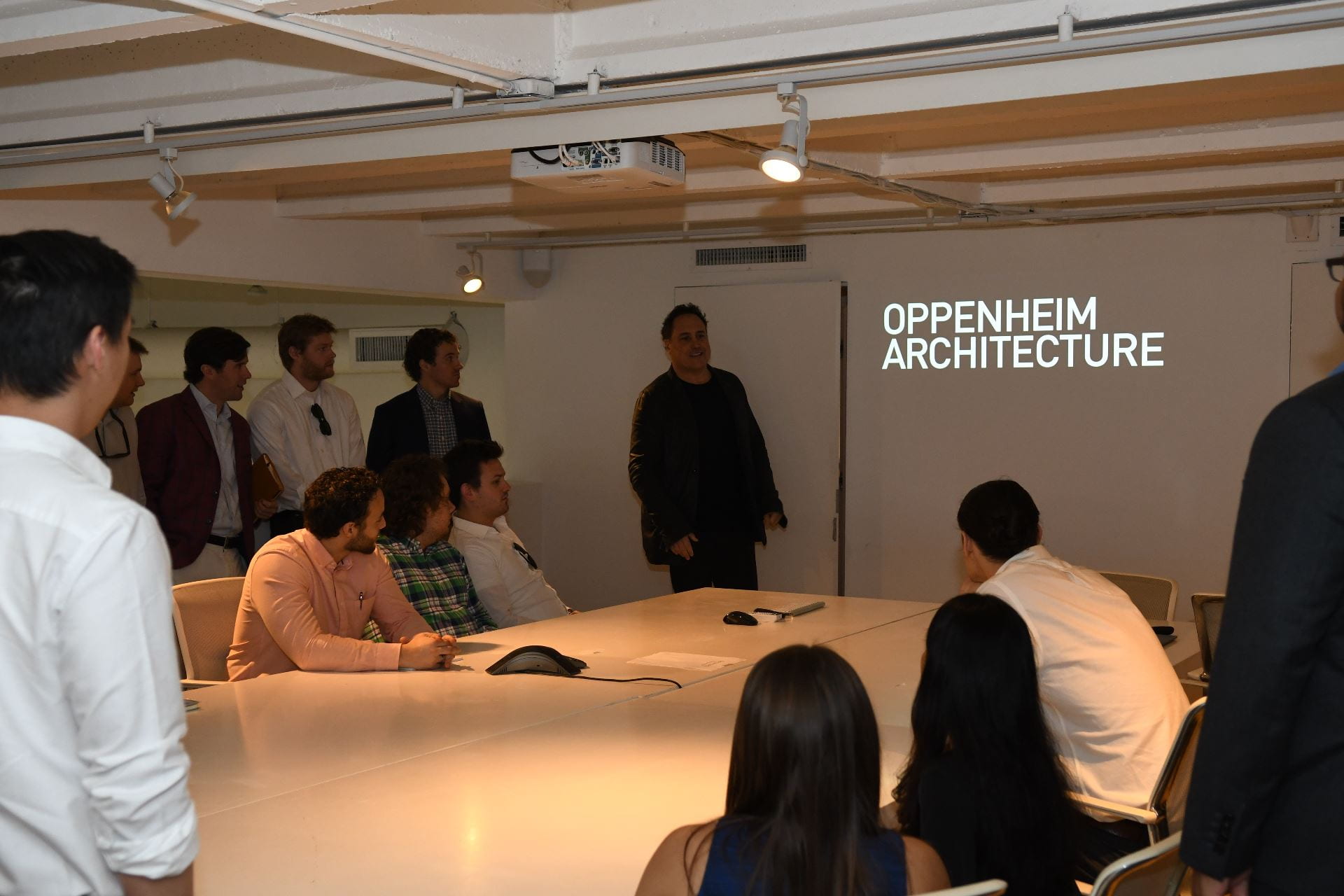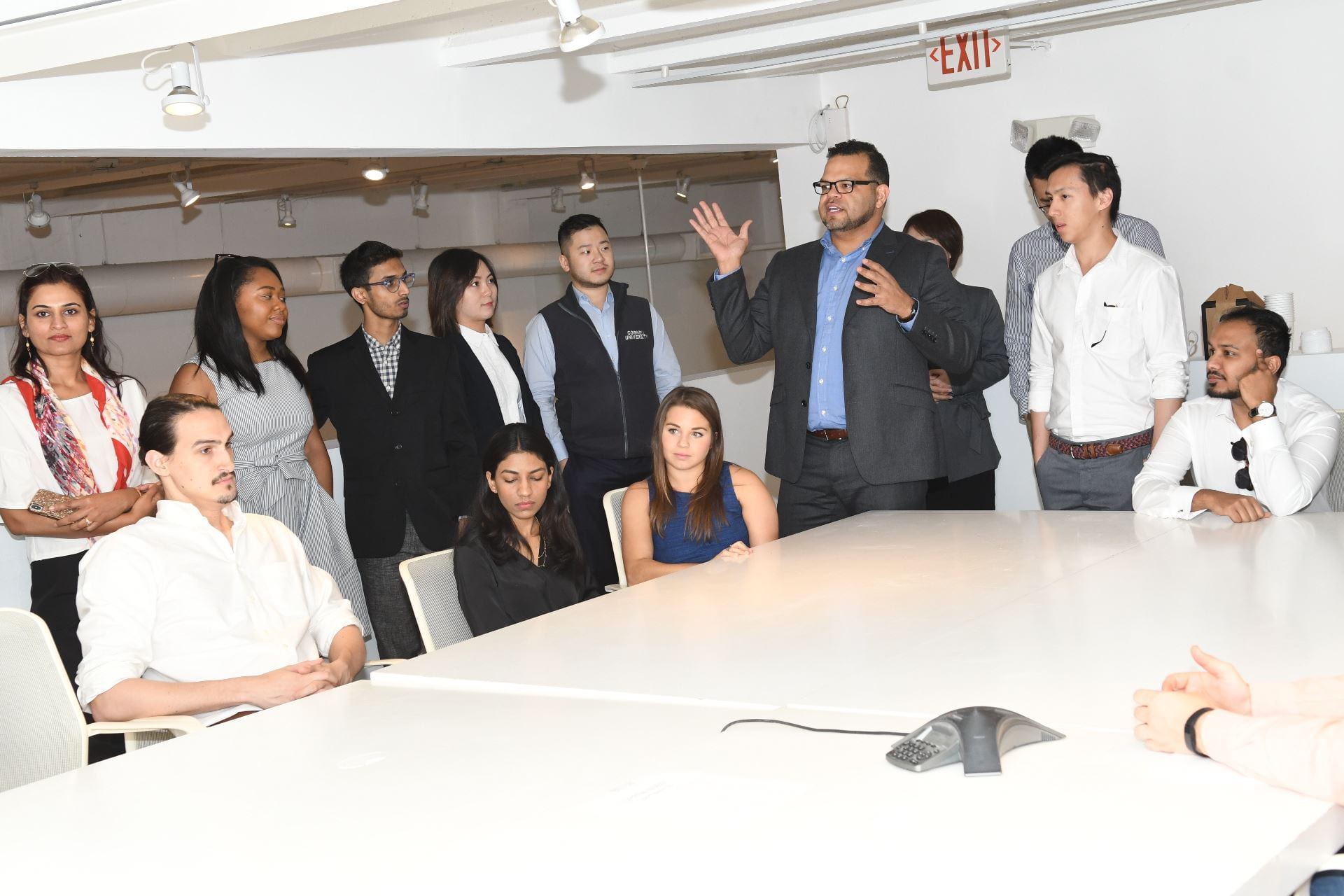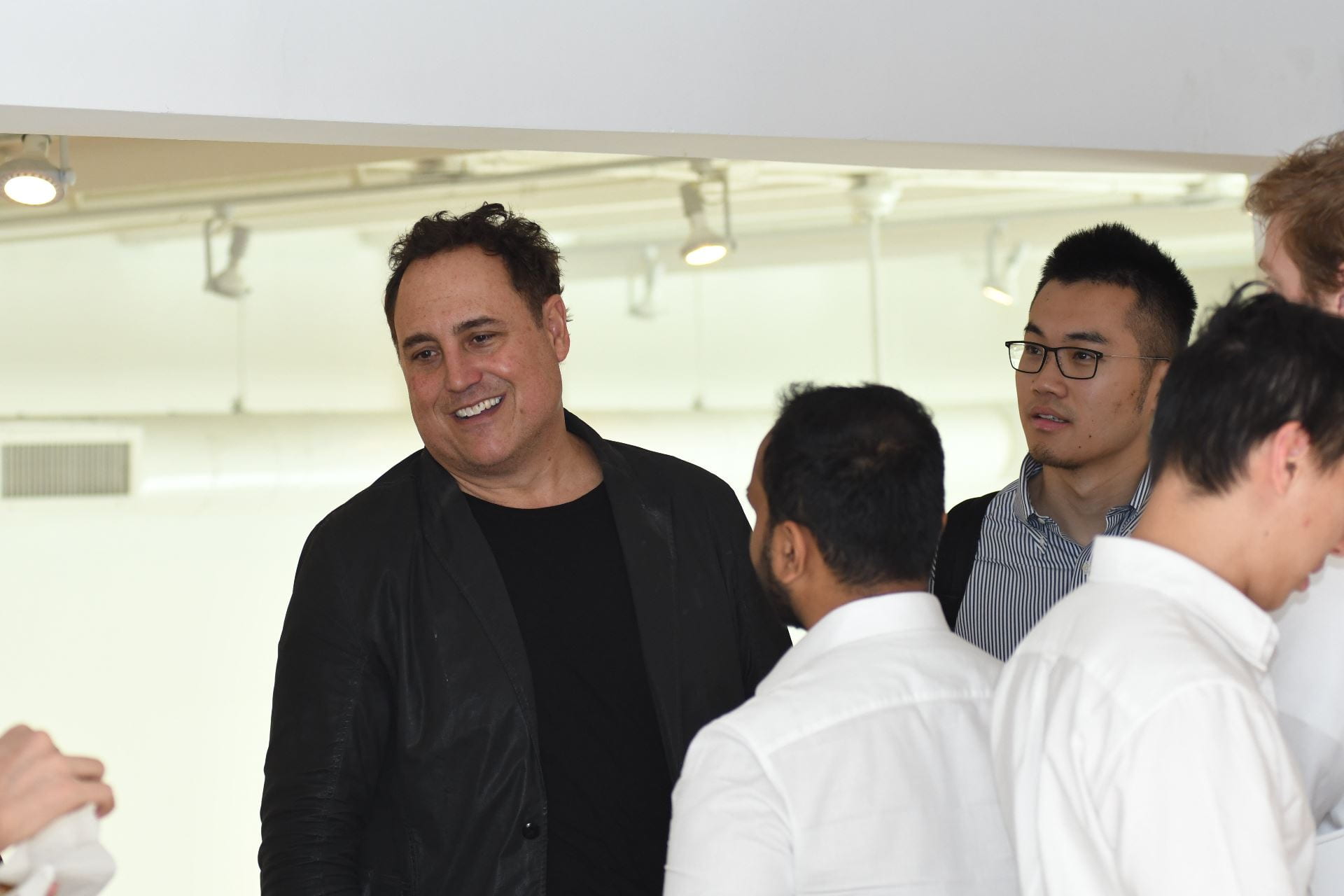 The first stop of the Cornell Baker Program’s Class of 2021 Miami Trek was a visit to the office of Chad Oppenheim, Principal and Lead Designer of Miami-based Oppenheim Architecture. The class gathered in the mezzanine conference room inside Oppenheim’s Miami office located in the famous Design District. The building itself is covered in greenery on the exterior and surrounded by trees, providing perhaps the block’s only cool, shady spot on an otherwise hot South Florida morning. Inside the building, white walls and interior furnishings elicit a modern minimalist feel, a trait synonymous with the projects Oppenheim discussed with the class.
The first stop of the Cornell Baker Program’s Class of 2021 Miami Trek was a visit to the office of Chad Oppenheim, Principal and Lead Designer of Miami-based Oppenheim Architecture. The class gathered in the mezzanine conference room inside Oppenheim’s Miami office located in the famous Design District. The building itself is covered in greenery on the exterior and surrounded by trees, providing perhaps the block’s only cool, shady spot on an otherwise hot South Florida morning. Inside the building, white walls and interior furnishings elicit a modern minimalist feel, a trait synonymous with the projects Oppenheim discussed with the class.
Oppenheim is a 1994 Cornell architecture graduate, and he moved to Miami, Florida, upon graduation to pursue his career. After working in an architecture firm there for five years, he left to prepare for his professional exams, and Oppenheim Architecture was founded shortly thereafter in 1999. Oppenheim’s goal in opening his own practice was to bring high-level architecture to Miami, which sounds commonplace today but was unusual in the late 1990’s and early 2000’s. Uniquely, Oppenheim began his practice as an independent architect by pursuing and completing his own developments, rather than solely working as a fee-based architect hired by outside development firms and homeowners. While that strategy has been modified over the last 20 years, Oppenheim Architecture maintains focus on socially- and environmentally-conscious architecture, while incorporating humans and nature in large-scale urban projects, hotels, resorts, luxury homes, and interiors – all of which were put on display during Oppenheim’s presentation to the Class of 2021.
Most of the early projects Oppenheim pursued as a designer/developer were in predominantly opportunistic areas, with the idea of its projects becoming catalysts for their specific neighborhoods. The early projects were primarily smaller residential buildings, such as a 16-unit for-sale condominium complex and an eight-home townhouse complex in Miami Beach. Oppenheim was initially focused on “super efficiency,” adopting the economical thought process of a developer and understanding that certain spaces in buildings cannot be sold, such as hallways. Subsequent larger luxury projects brought Oppenheim, and his growing brand, into the spotlight, such as his 10 Museum Park skyscraper where he sold condominiums for $450 per square foot, despite other condominiums in the area going for $300 PSF. Oppenheim’s growing reputation for designing luxurious Miami-lifestyle vibes trickled into the speculative home space, where he focused on incorporating this type of lifestyle into the natural environment and region where the building was located. Oppenheim’s notable residential resume includes projects such as the iconic former Miami Beach home of Carl Fisher, an Arkansas farmhouse retreat for Walmart’s Walton family, the Montclair Miami Beach, and Michael Bay’s Miami and Los Angeles homes.  As the transition into commercial designs commenced, Oppenheim remained committed to his passion: creating environmentally sensitive work in beautiful locations, while letting nature become the star. Hospitality and resort projects followed soon after, including the Toy Story Hotel in Shanghai for Disney, Equinox Hotel in Chicago, and resort work all over the world, including the Bahamas, Brazil, Costa Rica, and Bali. The global spread of Oppenheim’s brand led to the opening of a second office in Basel, Switzerland, which is run by a Cornell classmate. While Oppenheim started his firm doing many projects in the dual role of the designer and developer, the firm has since evolved to a more conventional structure where it designs projects for clients for fees, though in some cases it will invest some of these fees into projects for equity stakes. To demonstrate some recent projects, Oppenheim presented a city he has been tasked to design by the Crown Prince of Saudi Arabia. Incorporating the reefs of the Red Sea, occupiable sand dunes, and cliffs, Oppenheim is bringing the eco system into his design in a once-in-a-lifetime project, despite the cultural and financial differences.
As the transition into commercial designs commenced, Oppenheim remained committed to his passion: creating environmentally sensitive work in beautiful locations, while letting nature become the star. Hospitality and resort projects followed soon after, including the Toy Story Hotel in Shanghai for Disney, Equinox Hotel in Chicago, and resort work all over the world, including the Bahamas, Brazil, Costa Rica, and Bali. The global spread of Oppenheim’s brand led to the opening of a second office in Basel, Switzerland, which is run by a Cornell classmate. While Oppenheim started his firm doing many projects in the dual role of the designer and developer, the firm has since evolved to a more conventional structure where it designs projects for clients for fees, though in some cases it will invest some of these fees into projects for equity stakes. To demonstrate some recent projects, Oppenheim presented a city he has been tasked to design by the Crown Prince of Saudi Arabia. Incorporating the reefs of the Red Sea, occupiable sand dunes, and cliffs, Oppenheim is bringing the eco system into his design in a once-in-a-lifetime project, despite the cultural and financial differences.
Oppenheim concluded his presentation with a Q&A session, at which point he was asked whether the growth of his reputation globally has resulted in new work being easier to secure now as compared to when he started. Oppenheim admitted that, while the phones may ring more often now than they did in the beginning, he emphasized how important it is to prove your worth every day, no matter who you are or how long your company has been around. Oppenheim’s presentation surrounding high-end, luxurious, sustainable, and nature-centric design was an ideal foray into the remainder of the Class of 2021’s day in Miami’s Design District.

